All Articles
Summary of articles. Characteristics of stress. The basics of stress. Stress is a situation that triggers a particular biological response.
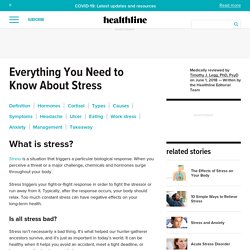
When you perceive a threat or a major challenge, chemicals and hormones surge throughout your body.
What is teenage stress?
Teenage stress: what is it?

Stress in teenagers – and anyone – can be unpleasant, but it’s not necessarily a bad thing. Stress is the way your body responds to challenges and gets you ready to face them with attention, energy and strength. When you feel you can cope with these challenges, stress gets you ready for action and gives you the motivation to get things done.
Why are teenagers more stressed than ever?
Parents might be mindful of buffering their own stress from their teens.
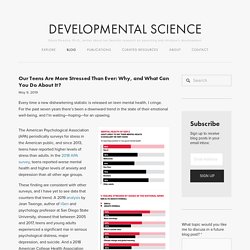
True, the parental brain has evolved to scan the environment for threats. But if parents pass on their stress, children can become overly stress-reactive, vigilant, and stress-sensitive. On the other hand, passing on constructive coping strategies is helpful. Building emotional intelligence skills is always important, too. Every teen will benefit from a) the ability to be aware of their feelings and b) having strategies for regulation. Resurrecting an old theory: Healthy identity development A third possibility is that society has forgotten about an important developmental task of adolescence.
Pressures teens face in today’s fast-paced world. Teens are under more stress today than ever before.
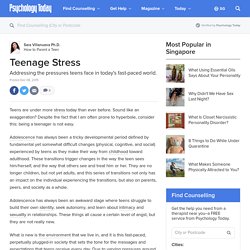
Sound like an exaggeration? Despite the fact that I am often prone to hyperbole, consider this: being a teenager is not easy. Adolescence has always been a tricky developmental period defined by fundamental yet somewhat difficult changes (physical, cognitive, and social) experienced by teens as they make their way from childhood toward adulthood.
These transitions trigger changes in the way the teen sees him/herself, and the way that others see and treat him or her.
6 Common triggers of teen stress. Stress and anxiety in the digital age. Teen stress rivals that of adults. If you think you're stressed out, imagine being a teenager in today's society.
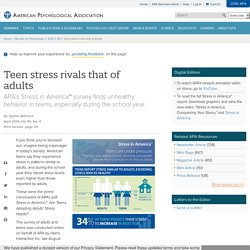
American teens say they experience stress in patterns similar to adults, and during the school year they report stress levels even higher than those reported by adults. These were the prime conclusions of APA's poll Stress in America™: Are Teens Adopting Adults' Stress Habits? The survey of adults and teens was conducted online on behalf of APA by Harris Interactive Inc. last August.
Teens 'more depressed and sleeping less'
Image copyright Getty Images Adolescents are more likely to feel depressed and self-harm, and are less likely to get a full night's sleep, than 10 years ago, a study suggests.
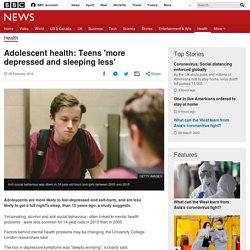
Yet smoking, alcohol and anti-social behaviour - often linked to mental health problems - were less common for 14-year-olds in 2015 than in 2005. Factors behind mental health problems may be changing, the University College London researchers said. The rise in depressive symptoms was "deeply worrying", a charity said.
More children and teens are stressed out. Last year, a Primary 5 pupil fell 17 floors from his bedroom window on the day he was supposed to take his exam papers home.
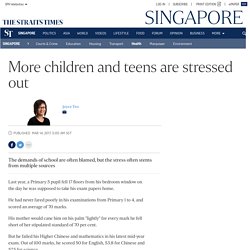
He had never fared poorly in his examinations from Primary 1 to 4, and scored an average of 70 marks. His mother would cane him on his palm "lightly" for every mark he fell short of her stipulated standard of 70 per cent. But he failed his Higher Chinese and mathematics in his latest mid-year exam.
More teens in Singapore seeking help for school stress. SINGAPORE (THE NEW PAPER) - More teenagers from top schools are seeking help at the Institute of Mental Health (IMH) for school-related stress.

IMH said that stress-related, anxiety and depressive disorders are common conditions seen at its Child Guidance Clinics, which treat children aged six to 18. The clinics saw an average of about 2,400 new cases every year from 2012 to 2017. Since IMH does not track the causes of the disorders, it does not have statistics on cases related to school stress.
Interdisciplinary framework on stress and adolescent well-being. Stress response and the adolescent brain. The impact of stress on students. Methods A single author (MP) searched PubMed and Google Scholar for peer-reviewed articles published at any time in English.
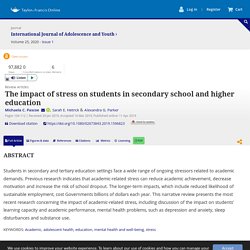
Search terms included academic, school, university, stress, mental health, depression, anxiety, youth, young people, resilience, stress management, stress education, substance use, sleep, drop-out, physical health with a combination of any and/or all of the preceding terms. A snowball strategy allowed for examination of references in identified articles, and inclusion of additional articles as appropriate. The author reviewed all potential articles for inclusion.
Adolescents coping with stress. Stress management for teens. In the short term, stress can push a child to practice for her piano recital or inspire a teen to study when he’d rather be out with friends.
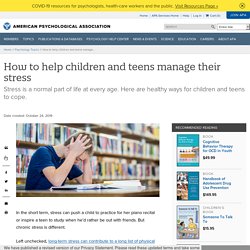
But chronic stress is different. Left unchecked, long-term stress can contribute to a long list of physical and mental health problems. Prolonged stress can cause high blood pressure, weaken the immune system and contribute to diseases such as obesity and heart disease. It can also lead to mental health problems such as anxiety and depression—disorders that are becoming more common in youth. In a 2018 study, researchers analyzed data from the National Survey of Mental Health and found that rates of anxiety and depression had increased in kids ages 6 to 17, from 5.4% in 2003 to 8.4% in 2011-12.
Keep your stress under control. Feeling like there are too many pressures and demands on you? Losing sleep worrying about tests and schoolwork? Eating on the run because your schedule is just too busy? You're not alone.
Managing social media stress with mindfulness. It’s hard to imagine life without social media. It has become essential to connecting with our friends, getting updates about what’s going on in the world and being entertained. We can barely remember (if we’re old enough to remember!)
How we stayed in touch without it. But teens and young adults are increasingly reporting that social media can also be a source of stress. What we hear a lot about, especially from teenagers, is that when they’re scrolling through feeds they are often (consciously or unconsciously) comparing themselves to others. But it can also hurt your self-esteem when your life doesn’t feel as perfect as everyone else’s looks. Similarly, people are talking so much about the fear of missing out that there’s an acronym for it. Staying connected When everything is online you also sometimes get proof that you are, indeed, missing out.
How to manage the digital-related stress. Coping with exam stress. A little stress can be a good thing: it can be the motivational push that we need to get things done. However, sometimes, dealing with stress (especially during exam season) can be a difficult thing to do. And, with an estimated 20-50% annual increase of university students seeking help for studies-related mental health issues, it's clear that we're under more pressure than ever before. So, here to your rescue are seven tips to help you through the stressful exam period. 1. Remember to breathe Setting aside a couple of minutes every day to practice mindfulness techniques, such as breathing exercises or UCL's 10 Minute Mind, helps you to calm down your body's stress response and shift your attention back to the present moment. 2. Pulling all-nighters, surviving on a poor diet, and getting minimal amounts of movement into your day can increase symptoms of anxiety. 3.










